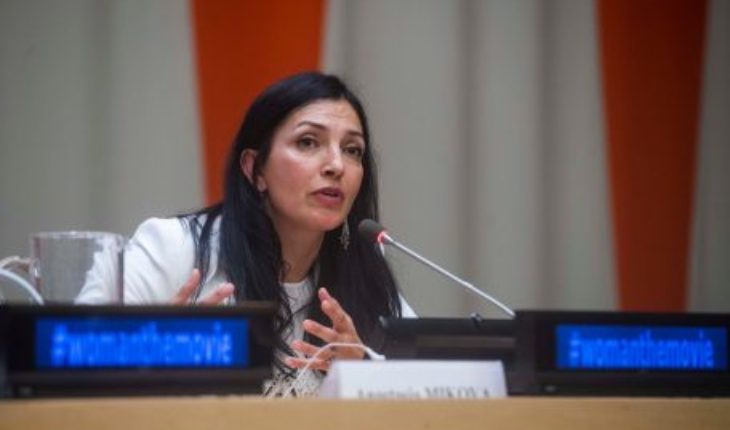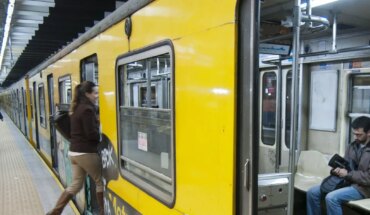It took more than 20 years to realize and accept that he had been a victim. Mexico’s Norma Bastidas was already at the height of her sporting career: she had been the fastest woman to run seven ultramarathons in the seven subcontinents in seven months, the 777 Run for sight, and received recognition from the popular American anchor Oprah Winfrey. But he had never spoken in public of the hell he lived in his youth.
It was until 2012, he decided to run from Vancouver, Canada, where he lived, back to his family home, in Mazatlan, Sinaloa, where he had begun a life of sexist abuse and violence. He ran for 78 days. When he crossed the border into Mexico, he came into contact with a network of refugees for victims of human trafficking in Tijuana. Until then, she had taken on to blame her years working with men in a bar in Japan, where she was deceived at 19, and there they helped her understand that it was not her fault.
Read: Violet Tournament: Women fight feminid violence with football in Edomex
Visiting Mexico for the launch of the documentary Woman, which is presented this Sunday at the Museum of Memory and Tolerance and gives voice to two thousand women about what it means to be a woman, Norma talks with Animal Político about how she transformed the course of her history.
Speak as fast as you run. You only have half an hour to give interviews and a lifetime to tell. Sufferings that still scare his voice when he remembers them, but triumphs that light his eyes, explaining that the ultramarathons are races of more than 50 kilometers, 100, 500, and that he loves the challenge of spending days running alone for hours.
The first sexual abuse she suffered was at age 11, in her own family. Today, at 52, she also raises her voice to talk about it, that Mexican girls will experience violence since they are born in their nearest environment and the community allows it.
At 19, she was offered an alleged job to be a model in Japan. It was the possibility of helping his family financially and he took it. But she found that she had actually been sold to a bar that put her to work with men, to do things she didn’t want, took her passport and without knowing the language or anyone else, she was left in a situation of absolute vulnerability.
But in 1986, she says, there was no talk of human trafficking and her idea of sexual slavery was a woman in chains, uneaten, abused, and hers didn’t look so bad. The women in that environment repeated to him over and over that what he was doing was normal and allowed him to send money to his family. If the less she fought, the calmer she was going to feel.
Read: SOS Women: Officials to touch house to house to identify cases of gender-based violence in CDMX
She tried to go to the Japanese police once, but they ignored her.
“How did you escape?
“You don’t escape… Somehow someone comes and helps you.”
Even in prostitution there are social classes, he explains, and in that same bar there were high-class geisha, women who were there on their own, but who did not do things they didn’t want.
“As in massages, there are those who do massage, and in the back there are vulnerable people who bring them, who do not have papers, who are being forced,” she says.
One of those was the only person who really listened to her, and when she was able to get her passport back, she helped her enter a school to get a student visa and learn Japanese. Norma, who already had problems with drinking, was still working at the bar because she didn’t have any money, but not in that “back.”
Find out: High school students in Oaxaca lead and denounce master bullies; add 11 cessations for the same reason
One day, they tried to kill her in the street. Maybe a reminder that it wasn’t that easy to get out, you think. And when he went to the police, they again ignored his complaint about the type of business he had been linked to.
Then he met a Canadian who asked for marriage and accepted without thinking.
‘It’s sad, I loved it very much but it’s sad that there’s no ransom, and often it’s a woman’s only way to get ahead, a marriage. Because I already had an education, I already spoke Japanese and yet there was still no way to stop the violence. It’s sad that we only respect a woman if she’s married. And it’s global,” he says.
He went to Canada, where he studied a career, got a job, had two children and although he divorced within a few years, his life already seemed normal. But she kept carrying the weight of her past on her back: in Mexico they knew what she was doing in Japan and she always felt judged.
When his eldest son turned 11, he was diagnosed with a degenerative eye disease, a dystrophy of cones and canes that would leave him blind, and that began to progress very quickly.
“That’s where I did, everybody went down on me, because I lost my job, all the security that I thought I already had. Because, they tell you: if you don’t go out, you don’t smoke anymore, you go to school, if you’re educated, you don’t go out with men, your life is going to be normal. And that’s when I realized it’s not that easy. Because the woman, always, because she is a woman, that we are regularly in charge of the children. And the moment my son was diagnosed that he was going to lose his sight, the one who took over, that he had to leave the job, it was me,” he laments.
“But that’s where I said, this time I’m not going to handle it like I’ve handled myself before. I’m going to fight. And I started running because I couldn’t sleep. Because I felt so angry, to say, well, it’s my turn to live a quieter life. And I thought, how many times do I have to start over? Well, whatever’s necessary. It’s that easy.”
The more I ran, the better I felt, and the more stress and worries, the more I ran. So he turned it into a routine. Until a friend proposed to her to run the Boston Marathon.
“I was about to turn 40, and someone giving you a little hope of something, when your life is out of control, that you have no control over whether or not you’re going to get fired, if your child is going to lose their sight tomorrow or in 10 years , and give you that hope of something you can control, because I can get up, put on my shoes and go for a run… That was an amazing thing. And I ran my first marathon about eight months after I started running. And then I said, what else do I have of potential in me that I haven’t given myself the chance? From now on I can’t find the limits.”
He began to do activism with the careers he did, to raise funds for foundations that helped people with problems like his son’s. There he realized that sport was a key to opening the door to people’s attention, who don’t know how to ask “how are you?” and doesn’t want to get involved in other people’s problems; but through the races they did care about her, and by the way, they ended up informing themselves of their son’s illness and offering him help.
It was also a way to be able to talk to men and start educating them, he says, because sport is a space they see more like theirs, and when they find a woman with those accomplishments, then they do pay attention to it.
After a few years, his son decided that he had accepted the condition with which he lived and no longer wanted his mother’s efforts to go to try to find him a cure. That’s when Norma realized that if her son no longer needed it, with the attention platform she already had, it was worth adopting as a cause the fight against the violence she herself had experienced.
They wanted to give him an award in his native Sinaloa for his activism over his son’s illness. And she just thought she’d done what any mother would do, but she hadn’t been accepted before with her life story, because when she had said she was a victim, the answer had been no, she did it because she wanted to.
“I ran away from my community and now they want to give me a prize! I said no. If they accept me, they accept me with everything, or hate me for everything. It’s not fair because I’m having the same tenacity to get ahead as a victim of trafficking and sexual violence as to get ahead as a mother of a child with a disability. It’s the same tenacity and we can’t say: this I do admire you, but this doesn’t. That’s where I said it would be easier if I ran away than if I mentally went back to the past. And I decided: that’s what I’m going to do.”
He called his career “Running home, fighting violence,” because if violence doesn’t eradicate from where it starts, it’s not going to end, he says. To her, fleeing her home did not protect her, because where she was going she was with more violence.
Until then she had not spoken publicly about what she lived, but only with few people who knew and loved her. “It’s one thing that doesn’t heal you to speak it publicly; it helps you to talk to the right people you know are going to react appropriately to help you. That’s what ital with. Not the secret. But speaking it publicly and exposing yourself to revictimization is one of the most dangerous things,” he reflects. Still, he decided it was time.
Norma transformed her victim status from that of survivor. For her, she is not only a victim when she is living a situation like sexual exploitation, but also after, because the aftermath in her case was still marked, because she came to think that she did not have the ability to make good decisions in her life and that she was never going to log i didn’t even deserve to get ahead. She assumed herself as a survivor when she realized it wasn’t her, but the circumstances.
“That’s the difference… My past does not change; what changed is my perception of what happened. It’s when you know the past isn’t going to define you and it’s not going to destroy you. Of course it’s going to affect you many times in a negative way, one way or another, but you’re absolutely sure you can get ahead.”
Having been the fastest woman in race 777 in 2009, and crossing from Canada to Mexico in 2012, in 2014 she set the Guinness World Record for making the world’s longest triathlon. He swam, cycled and ran more than six thousand miles from Cancun to Washington DC, crossing centrally mexico to Ciudad Juarez. She did so along the route of the traffickers of girls and women. He did it for them. And he never shut up or be ashamed of what had happened to him again.
You may be interested: 63,000 protective orders are issued to women, but the state fails to give them security
She thought the reception of the subject was going to be negative, because even the family tried to tell her that better no, with the idea of protecting her, but the response was totally positive.
“The messages that come to me from people who don’t know me, who take the time to tell me everything you think, that’s amazing, it’s amazing the positive response. Also from people who tell me: you helped me, I have time dealing with this, no one listens to me, and so far I have not felt validated my pain and you are the only person i now feel that I identify with you,” she says.
“The nicest thing I’ve been told is once I presented one of my documentaries when I broke the Guinness Book, a survivor of sex trafficking said to me, “I’ve never felt sorry for who I am or my past, but it’s the first time I’ve been proud.”
What we do in Animal Político requires professional journalists, teamwork, dialogue with readers and something very important: independence. You can help us keep going. Be part of the team.
Subscribe to Animal Politician, receive benefits and support free journalism.#YoSoyAnimal
translated from Spanish: from victim of sexual exploitation to marathoner
March 7, 2020 |





